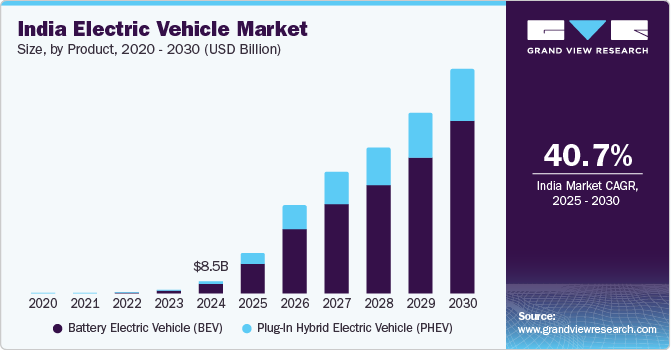India Electric Vehicle Market 2030: Government Initiatives Fueling Growth
What is Driving the EV Market in India?
The Indian electric vehicle market has been growing at an exciting pace in recent years. As people look for cost-effective and environment-friendly alternatives to traditional vehicles, electric vehicles are quickly gaining popularity in India. With its massive population and rapid urbanization, the country presents a huge potential for EV adoption.
Technological improvements in battery technology have significantly reduced the cost of electric vehicles and increased their range. Batteries were once the most expensive component of an EV. However, they are becoming more affordable and efficient, allowing EVs to travel longer distances on a single charge. This is a major factor in improving the attractiveness of electric vehicles for consumers.
It is remarkable that even with subsidies, the upfront cost of electric vehicles can still be high, especially for more premium models. Second, the fear of running out of battery without a nearby charging station also remains a concern for many potential EV buyers in the country. However, with continued investment in charging infrastructure, local manufacturing, and favorable policies, EVs could soon become mainstream in India. The Indian electric vehicle industry is expected to cross USD 152 billion by the year 2030, growing at a CAGR of 40.7% from 2025 to 2030. The sales of EVs in the country rose from 1.50 million units in 2023 to 1.94 million units in 2024, indicating an increase of 26%. Why this industry has so much potential in India? Let us try to understand.

Key Growth Drivers for the Indian EV Market
- Environmental Concerns: One of the major reasons for the increasing popularity of electric vehicles is the growing concern about environmental pollution. In India, switching to electric vehicles is being seen as a necessary step to reduce air pollution. EVs do not produce tailpipe emissions, making them a cleaner alternative to traditional vehicles that run on fossil fuels.
- Government Policies: The Indian government has recognized the importance of EVs and has introduced various policies to promote their adoption. The Faster Adoption and Manufacturing of Hybrid and Electric Vehicles (FAME) scheme is one such initiative, offering subsidies on the purchase of electric vehicles and charging infrastructure. These incentives help reduce the upfront cost of EVs, making them more affordable for the average consumer.
- Cost of Ownership: Although electric vehicles can be expensive to purchase initially, they offer lower operating costs in the long run. EVs have fewer moving parts compared to traditional vehicles, meaning lower maintenance costs. Additionally, the cost of electricity is much lower than petrol or diesel, which makes EVs more affordable to operate over time.
- Improved Charging Infrastructure: The availability of charging stations is critical to the widespread adoption of electric vehicles. India is rapidly expanding its EV charging infrastructure, making it more convenient for EV owners to charge their vehicles. Government initiatives, as well as private investments, are contributing to the establishment of public and private charging stations across the country. In February 2024, Hyundai Motor India Limited (HMIL) expanded its Ultra-Fast Public EV Charging Network by setting up 11 charging stations across Mumbai, Ahmedabad, Pune, Hyderabad, Gurugram, and Bangalore. With this, Hyundai has become the sole original equipment manufacturer (OEM) in the country to set up such an extensive charging infrastructure.
How Rules and Regulations Impact the EV Industry in India
Government regulations play a crucial role in the growth of the electric vehicle market in India. The government’s role in providing subsidies for electric vehicles helps make them more affordable. The FAME scheme and state-specific incentives are key contributors to the growth of the EV market. These policies help reduce the purchase price of electric vehicles, thus encouraging more consumers to make the switch from traditional vehicles.
Strict emissions regulations are pushing automakers to develop cleaner technologies. The Indian government’s push toward adopting Bharat Stage VI (BS6) emissions standards for internal combustion engine vehicles has created a more favorable environment for electric vehicles.
The government is also setting standards and regulations for the installation of EV charging stations. Policies that allow the establishment of private charging networks and ease of access for consumers play a crucial role in the convenience and growth of EV adoption.
Recent Developments in the Indian EV Industry
- In February 2024, Gensol Electric Vehicles Pvt. Ltd. received Automotive Research Association of India (ARAI) certification for its compact 2-door, 2-seater EV. This certification paves the way for the EV's launch and sale in the Indian market.
- In February 2024, Tamil Nadu Chief Minister MK Stalin laid the foundation stone of Vietnamese company VinFast Auto's EV and battery product facility in Thoothukudi. According to reports, the plant will have the capacity to manufacture 150,000 vehicles once it becomes operational.
Order a free sample PDF of the India Electric Vehicle Market Intelligence Study, published by Grand View Research.
Comments
Post a Comment